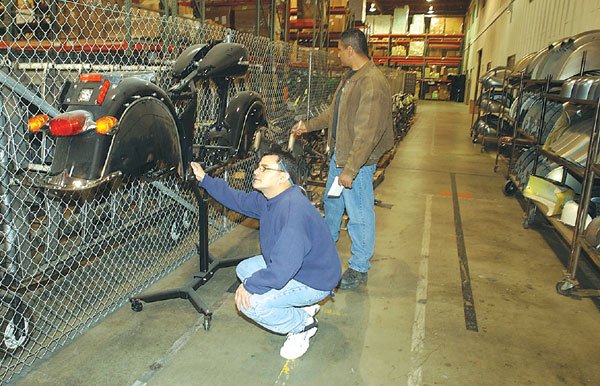GILROY
– After a day of showing equipment at the former Indian
Motorcycle factory, Michigan businessman Bill Melvin met with local
resident Rey Sotelo Monday evening to talk about teaming up to buy
the Indian brand.
GILROY – After a day of showing equipment at the former Indian Motorcycle factory, Michigan businessman Bill Melvin met with local resident Rey Sotelo Monday evening to talk about teaming up to buy the Indian brand.
“We’re talking; we’ve been talking for a long time,” Melvin said Monday afternoon, confirming what Sotelo announced early Monday. “I’m very open to any legitimate proposal to help us accomplish our common goals.”
Those goals include restarting Indian Motorcycle production in Gilroy, something both men have named as a priority since announcing their intentions to buy the historic motorcycle company in October.
Sotelo brought the company’s headquarters to Gilroy in 1998. At the time, he was an up-and-coming custom bike builder and Indian motorcycles hadn’t been built in the United States since 1953. The 200 East Tenth St. building that Indian would occupy was the abandoned former headquarters of the Nob Hill Foods chain of supermarkets.
Whether that building will again house motorcycle production is very much in doubt. Credit Manager’s Association of America – which Indian hired to liquidate its trademarks and Gilroy factory – set Wednesday as the day it will auction off the 154,000-square-foot structure and the 274,000 square feet of land it sits on. The auction will begin at 1 p.m. at the Strand Theater, 7588 Monterey Road, according to the auctioneer, Mario Piatelli. CMA now owns the property, which Indian assigned to the firm late last week. Piatelli claims on his Web site that the property has been valued at $10 million.
“We have maybe 10 or 12 people interested, and we think it’s going to be sold,” Piatelli said Monday.
Also on Wednesday, Melvin will begin selling off many of the contents of the Tenth Street headquarters – contents which he bought last week through his Grand Rapids, Mich.-based company, National Retail Equipment Liquidators.
Meanwhile, the sale of the Indian brand – that is, its collection of trademarks and logos – is still wide open, although CMA and Indian officials are in active negotiations with two bidders, according to Indian Chairman Frank O’Connell and CMA Estate Manager Michael Joncich.
Both O’Connell and CMA Estate Manager Chuck Klaus said they expect to sell the trademarks by late February.
The auction for Indian’s assets began three months ago, with CMA and Indian trying to sell the brand, the factory and its contents as a package deal to a single company that would restart production in Gilroy. That plan was scuttled earlier this month when CMA officials “recognized that we were going to be unable to find an acceptable offer for all of the assets,” Joncich said.
Therefore, CMA scheduled an auction for the real estate and inventory. Melvin pre-empted this, however, by buying all the inventory for an amount neither he nor CMA officials would disclose.
CMA canceled its auction, but Melvin decided to sell a large portion of the inventory beginning on the same day, Wednesday. Melvin, in Gilroy this week, expects this negotiated sale – not an auction, he pointed out – to last “weeks and weeks and weeks” until everything he wants to sell is sold.
The things he doesn’t want to sell, he said – despite his admission that they were still on display Monday – include any equipment needed to restart motorcycle production, as well as all 38 of Indian’s 2004 motorcycles.
“We’re thinking that we may just retain all of those (2004) bikes for a collection,” said Melvin, an avid motorcycle collector. “I don’t think anyone else in the world has an entire year’s production of motorcycles in their collection.”
“He’s a big motorcycle collector from way back,” Matt Steers, one of Melvin’s NREL employees, said of his boss Monday at the Indian plant. “I personally think that’s why he bought the place, is to get those bikes.”
Melvin may not have every single 2004 Indian. Missing on Monday was a red Scout 2-10, a new model, seen in promotional photos. O’Connell said Indian held back a handful of 2004 bikes for whoever buys the trademarks.
Inventory dealing is right in Melvin’s line of work, but building motorcycles – which he still says he hopes to do – would be new. Right now, the only vehicles NREL makes are shopping carts.
On Monday at the Indian factory, people checked out the goods. One room contained parts: motors, fenders, frames, gas tanks, kickstands, transmissions, tires, wheels and handlebars. Another room contained heavy machinery, tools, computers and bin after bin of bolts, washers and clamps. A third contained clothing and accessories. Parked outdoors were trucks and trailers for sale.
There were also leftover motorcycles, the 2004s plus 21 others. Among these were some oddities: a lavender, police-style Chief with a “City of Anville Traffic Officer” badge on the gas tank and two other police-style Chiefs – one wrecked, one whole – used in the Arnold Schwarzenegger movie, “Terminator 3: Rise of the Machines.”
While some people were looking at machinery or tools for use in their own businesses, Lonnie and Deborah Ashton of Palo Alto came more out of curiosity than anything else. They found it a sobering experience.
“It’s just a shame that there are so many people out of work,” Lonnie said, pointing to a row of work stations. Indian laid off about 380 employees when it closed its doors Sept. 19.
“It was such a good bike,” Deborah said. “I’m surprised it went out of business.”
Viewing of the sale items also takes place today until 4 p.m. The sale begins at 9:30 a.m. Wednesday.













